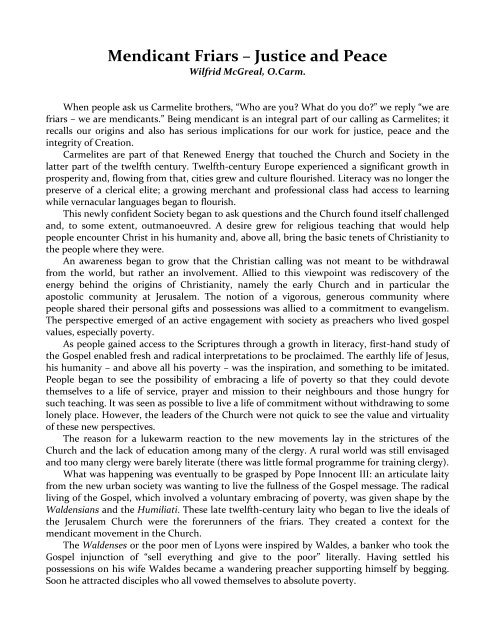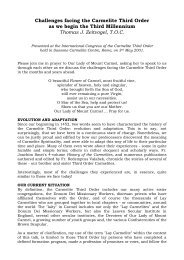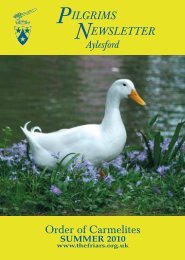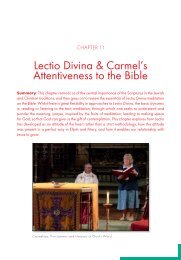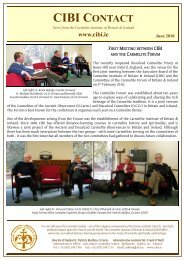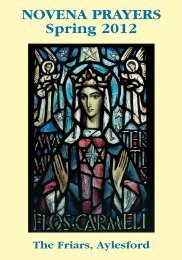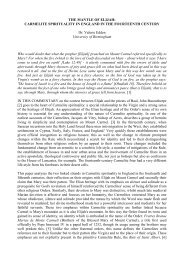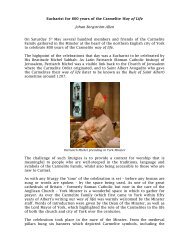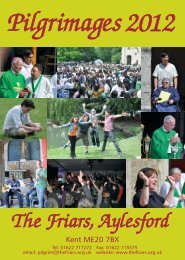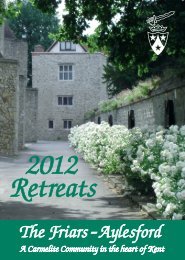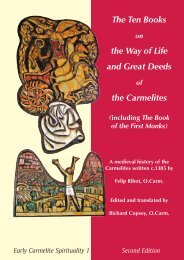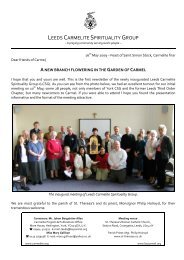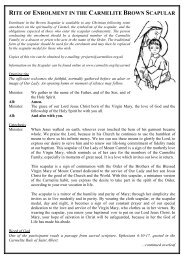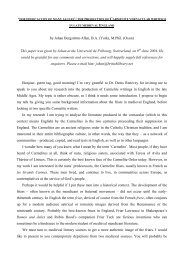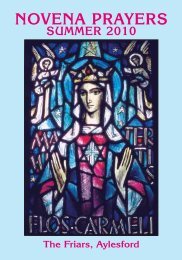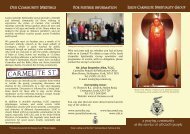Mendicant Friars – Justice and Peace
Mendicant Friars – Justice and Peace
Mendicant Friars – Justice and Peace
Create successful ePaper yourself
Turn your PDF publications into a flip-book with our unique Google optimized e-Paper software.
<strong>Mendicant</strong> <strong>Friars</strong> <strong>–</strong> <strong>Justice</strong> <strong>and</strong> <strong>Peace</strong><br />
Wilfrid McGreal, O.Carm.<br />
When people ask us Carmelite brothers, “Who are you? What do you do?” we reply “we are<br />
friars <strong>–</strong> we are mendicants.” Being mendicant is an integral part of our calling as Carmelites; it<br />
recalls our origins <strong>and</strong> also has serious implications for our work for justice, peace <strong>and</strong> the<br />
integrity of Creation.<br />
Carmelites are part of that Renewed Energy that touched the Church <strong>and</strong> Society in the<br />
latter part of the twelfth century. Twelfth-century Europe experienced a significant growth in<br />
prosperity <strong>and</strong>, flowing from that, cities grew <strong>and</strong> culture flourished. Literacy was no longer the<br />
preserve of a clerical elite; a growing merchant <strong>and</strong> professional class had access to learning<br />
while vernacular languages began to flourish.<br />
This newly confident Society began to ask questions <strong>and</strong> the Church found itself challenged<br />
<strong>and</strong>, to some extent, outmanoeuvred. A desire grew for religious teaching that would help<br />
people encounter Christ in his humanity <strong>and</strong>, above all, bring the basic tenets of Christianity to<br />
the people where they were.<br />
An awareness began to grow that the Christian calling was not meant to be withdrawal<br />
from the world, but rather an involvement. Allied to this viewpoint was rediscovery of the<br />
energy behind the origins of Christianity, namely the early Church <strong>and</strong> in particular the<br />
apostolic community at Jerusalem. The notion of a vigorous, generous community where<br />
people shared their personal gifts <strong>and</strong> possessions was allied to a commitment to evangelism.<br />
The perspective emerged of an active engagement with society as preachers who lived gospel<br />
values, especially poverty.<br />
As people gained access to the Scriptures through a growth in literacy, first-h<strong>and</strong> study of<br />
the Gospel enabled fresh <strong>and</strong> radical interpretations to be proclaimed. The earthly life of Jesus,<br />
his humanity <strong>–</strong> <strong>and</strong> above all his poverty <strong>–</strong> was the inspiration, <strong>and</strong> something to be imitated.<br />
People began to see the possibility of embracing a life of poverty so that they could devote<br />
themselves to a life of service, prayer <strong>and</strong> mission to their neighbours <strong>and</strong> those hungry for<br />
such teaching. It was seen as possible to live a life of commitment without withdrawing to some<br />
lonely place. However, the leaders of the Church were not quick to see the value <strong>and</strong> virtuality<br />
of these new perspectives.<br />
The reason for a lukewarm reaction to the new movements lay in the strictures of the<br />
Church <strong>and</strong> the lack of education among many of the clergy. A rural world was still envisaged<br />
<strong>and</strong> too many clergy were barely literate (there was little formal programme for training clergy).<br />
What was happening was eventually to be grasped by Pope Innocent III: an articulate laity<br />
from the new urban society was wanting to live the fullness of the Gospel message. The radical<br />
living of the Gospel, which involved a voluntary embracing of poverty, was given shape by the<br />
Waldensians <strong>and</strong> the Humiliati. These late twelfth-century laity who began to live the ideals of<br />
the Jerusalem Church were the forerunners of the friars. They created a context for the<br />
mendicant movement in the Church.<br />
The Waldenses or the poor men of Lyons were inspired by Waldes, a banker who took the<br />
Gospel injunction of “sell everything <strong>and</strong> give to the poor” literally. Having settled his<br />
possessions on his wife Waldes became a w<strong>and</strong>ering preacher supporting himself by begging.<br />
Soon he attracted disciples who all vowed themselves to absolute poverty.
Waldes <strong>and</strong> his followers were dismissed as illiterate but that only meant they could not<br />
read the Latin of the schools. They did have Provencal translations of the Gospel <strong>and</strong> the langue<br />
d’oc was spoken in northern Spain, southern France <strong>and</strong> north Italy. The fact that Waldes <strong>and</strong><br />
his followers insisted on preaching incurred the wrath of the Church authorities <strong>and</strong> no amount<br />
of protestation of orthodoxy could protect them from the charge of heresy. Pope Lucius III,<br />
influenced by the Archbishop of Lyons, condemned the Waldensians, driving many of them<br />
into conflict with the Church; however, some of the “poor men” remained in the Church <strong>and</strong><br />
gradually allied themselves with the Humiliati. This movement, that was strongest in Northern<br />
Italy, was given support by the new pope, Innocent III, who was motivated by shrewd<br />
intelligence <strong>and</strong> pragmatism. Again poverty, simplicity <strong>and</strong> penitential practices marked this<br />
movement which anticipated many features of the friars. The group attracted recruits from the<br />
aristocracy <strong>and</strong> the new middle classes with communities ranging from Milan to Verona. Some<br />
of the Humiliati were married, pursuing trades or professions but living a penitential ‘life’;<br />
others lived in community <strong>and</strong> devoted themselves to preaching. The clergy condemned these<br />
lay preachers but the pope recognised the value of what they were doing. His decision was<br />
revolutionary but also pragmatic. The Humiliati were orthodox in their teaching <strong>and</strong> provided a<br />
counter balance to the teachings of the Cathars whose dualism <strong>–</strong> <strong>and</strong> what was at bottom antilife<br />
teaching <strong>–</strong> was perceived as a threat not just to the Church but to Society itself.<br />
The other group of poor Christians were the hermits <strong>and</strong> pilgrims who made their way to<br />
the Holy L<strong>and</strong>. Again they were inspired by their reading of the Gospel, wanting to experience<br />
the places where Jesus had lived his mission. Such pilgrims were often hermits <strong>and</strong> again ready<br />
to preach, sharing their experiences with the people they encountered. Renunciation <strong>and</strong><br />
penance were again the energy that inspired such pilgrims. As Carmelites we can recognise in<br />
these poor men, enthused by the Gospel, the profile of those who were to live on Mount<br />
Carmel, pilgrims who put down roots in the Holy L<strong>and</strong>, no longer anxious to return to Europe.<br />
It was at this stage out of the religious turbulence <strong>and</strong> growing prosperity of Western<br />
Europe that the movement known as the friars was to emerge. At the heart of that movement<br />
was a layman, Francis of Assisi, with a powerful but simple vision: evangelical perfection, <strong>and</strong><br />
perfection that would be aided by complete destitution. What interests us today is the<br />
influence of that vision <strong>and</strong> how far its essence can still touch the life of the Church <strong>and</strong> Society<br />
today. [On the historical background to the medicants see C. H. Lawrence, The <strong>Friars</strong>: the<br />
impact of the early mendicant movement on Western Society, (London: Longman, 1994).]<br />
Francis was visionary <strong>and</strong> charismatic; how his vision, his ideal was eventually lived out has<br />
been seen either as a betrayal or the necessary condition for the development of a permanent<br />
organisation. Francis is famous for his voluntary act of renunciation giving up wealth for a<br />
solitary life of prayer, penance <strong>and</strong> poverty. He was undoubtedly influenced by the Waldensians<br />
<strong>and</strong> Humiliati but he saw radical poverty as an aid to his work of proclaiming the Gospel. He<br />
envisaged a fraternity based on the life of Christ <strong>and</strong> the disciples as depicted in the Gospel. He<br />
wanted a literal following of Christ’s life on earth <strong>and</strong> this is expressed in the First Rule: “The<br />
brothers shall appropriate nothing to themselves, neither a place nor anything, but as pilgrims<br />
<strong>and</strong> strangers in this world, serving God in poverty <strong>and</strong> humility, they shall with confidence go<br />
seeking alms. Nor need they be ashamed, for the Lord made himself poor for us in this world,<br />
this is that summit of most lofty poverty which has made you, my most beloved brothers, heirs<br />
<strong>and</strong> kings of the kingdom of heaven.”
Francis asked his followers to renounce not just personal property but also corporate<br />
property. He wanted to live in total dependence on the providence of God “naked to follow the<br />
naked Christ” (Saint Jerome).<br />
The pope authorised Francis’ initiative <strong>and</strong> soon his little brothers included men from all<br />
walks of life: aristocrats, academics <strong>and</strong> artisans. Francis preached repentance, moving away<br />
from feuds <strong>and</strong> hatred, <strong>and</strong> building peace. For Francis nature was the great picture book of<br />
God’s love <strong>and</strong> abundance. Francis never wavered in his belief in absolute poverty but after his<br />
death, as his followers became a universal missionary enterprise, compromise was realised as<br />
churches were built <strong>and</strong> priories founded. However the friars lived on the edges of the new<br />
towns <strong>and</strong> cities, dependent on the generosity of the people for survival, but also close to those<br />
they wanted to evangelize.<br />
While Francis was inspiring a new way of living the Gospel in Italy, Dominic was creating<br />
an order of preachers who were organised <strong>and</strong> educated but also committed to poverty. For<br />
Dominic the mission of preaching <strong>and</strong> a democratically constituted community mattered, but<br />
his way of living again valued radical poverty.<br />
Dominicans in their missions were ordered to travel on foot which meant they kept contact<br />
with the people. The communities of brothers <strong>–</strong> friars <strong>–</strong> caught the popular imagination <strong>and</strong><br />
while the church establishment viewed their arrival with misgiving they never wanted for<br />
patrons.<br />
L<strong>and</strong> was available in the new suburbs while royal patronage was also forthcoming. The<br />
size of the churches built for the friars was not meant to indicate power or prestige but rather a<br />
large space to accommodate the crowds who came to hear the friars preach. The friars preached<br />
peace <strong>and</strong> reconciliation <strong>and</strong> gave the people a sense of hope <strong>and</strong> purpose. Holiness was<br />
something that could be achieved in married life <strong>and</strong> being involved in society; it did not entail<br />
withdrawal from life into some remote place. Such preaching moved people to repentance <strong>and</strong><br />
as a result people turned to the friars as confessors who would provide underst<strong>and</strong>ing. The<br />
idealism <strong>and</strong> simplicity of the early friars made them popular teachers, as they were perceived<br />
as being sensitive to people’s needs.<br />
The commitment to preaching <strong>and</strong> helping people in their spiritual journey prompted an<br />
awareness among the friars of the need for learning <strong>and</strong> education. The friars soon became<br />
involved in the universities, some in pursuit of learning <strong>and</strong> others who had come from<br />
academic backgrounds returning to the schools.<br />
However the friars did not see university life as a profession or a career path; rather they<br />
saw the disinterested pursuit of truth as a high Christian value. Teaching was not a step on the<br />
road to benefice, but rather a service to the community. <strong>Friars</strong> were happy to go from one place<br />
to another, teaching <strong>and</strong> sharing their experiences. Because they were free from purely material<br />
considerations they had the freedom to pioneer Greek <strong>and</strong> Hebrew studies <strong>and</strong> be open to<br />
innovations. The great schoolmen of the Thirteenth Century, Thomas Aquinas, Bonaventure<br />
<strong>and</strong> Albert, were as much mystics as academics, <strong>and</strong> others like Tauler <strong>and</strong> Eckhart were as<br />
happy preaching in the market place as they were researching in a library.<br />
While the friars first <strong>and</strong> foremost spoke to the growing populations of the new towns their<br />
commitment <strong>and</strong> integrity appealed to the wealthy <strong>and</strong> even the powerful in society.<br />
Benefactors were quick to come forward, donating l<strong>and</strong>, paying for the building of churches<br />
<strong>and</strong> community lodgings. The friars obviously made an impact <strong>and</strong> such practical support<br />
enabled them to consolidate their apostolic activities.
Kings were also impressed. Henry III of Engl<strong>and</strong> <strong>and</strong> Louis IX of France were both<br />
promoters of the new mendicant orders. <strong>Friars</strong> were in dem<strong>and</strong> as preachers <strong>and</strong> were often<br />
entrusted with delicate diplomatic missions. The friars appealed because they seemed to<br />
combine integrity <strong>and</strong> intelligence. However the friars did not seem beholden to their royal<br />
patrons <strong>and</strong> when outspokenness was called for they could respond with vigour <strong>and</strong> c<strong>and</strong>our.<br />
Adam Marsh, one of the early English Franciscans, was c<strong>and</strong>id enough to earn the fury of Henry<br />
III who had also been criticised by the Dominican Roger Bacon. King Louis of France, who was<br />
also faced with tough speaking from friars, was more inclined to reflect rather than rant.<br />
The later Middle Ages saw the friars struggling to live up to their ideals. Sometimes poverty<br />
suffered, while often the freedom involved in the lifestyle of mendicant preachers was abused.<br />
Chaucer’s Canterbury Tales paints a less than flattering picture of a friar, while Langl<strong>and</strong>’s Piers<br />
Plowman saw a terrible fall from grace amongst the mendicants. Whenever a reform movement<br />
took place among the friars, the emphasis was on a deeper commitment to community life <strong>and</strong><br />
the living out of poverty. Community <strong>and</strong> common ownership went h<strong>and</strong> in h<strong>and</strong>. Too often<br />
friars evaded community life by becoming chaplains to the powerful <strong>and</strong> losing touch with<br />
community living.<br />
When we look at the Sixteenth-Century Reformation in Western Europe there was a<br />
significant involvement by friars. Many genuinely wanted to reform the Church <strong>and</strong> not to<br />
break up its unity. Such reformers were involved in university life <strong>and</strong> were caught up in the<br />
ferment of ideas that spread through Europe, helped by the recent invention of the printing<br />
press. The climate was not favourable to any official openness <strong>and</strong> to new ideas, since the<br />
Papacy lacked the creative intelligence of a pope Innocent. The popes in the early Sixteenth<br />
Century were, in the main, caught up in political struggles, <strong>and</strong> religious uniformity was by <strong>and</strong><br />
large a concern of kings, princes <strong>and</strong> the emperor. However, if anything did contribute to a<br />
general malaise in the Church it involved wealth <strong>and</strong> the flamboyant use of resources.<br />
In the light of this historical background, what does being a mendicant, trying to live a<br />
simple life as a friar, mean today? Our present century is an age marked by globalisation,<br />
consumerism <strong>and</strong> as emphasis on choice. Our planet is divided, a planet with gross inequalities,<br />
increasingly scarce resources <strong>and</strong> too many people “excluded from that banquet of life.” A<br />
culture that extols choice <strong>and</strong> then excludes most members of society because they have no<br />
money is fuelling conflict. Choice becomes a hollow concept in communities where children<br />
have to take their turn in having access to a meal.<br />
Some fifty years on, it is clear that the Second Vatican Council in the 1960s was a watershed<br />
for religious life. Its documents on the Church <strong>and</strong> liturgy allowed a space for renewal that was<br />
further helped by renewal in biblical studies <strong>and</strong> in the reading of history. Marxism <strong>and</strong> the<br />
market were also realities that had significant impact.<br />
The Marxist analysis of history brought a critical viewpoint that made many religious<br />
challenge the assumptions that shaped social <strong>and</strong> economic life. Catholic social teaching had<br />
also begun to analyse social structures <strong>and</strong> stressed the role of the worker over the profit<br />
motive <strong>and</strong> capital. In fact the Church’s social teaching came to assert that private property is<br />
not an absolute right, but rather an aspect of stewardship. Property brings responsibilities <strong>and</strong><br />
is not something that is for the exclusive use of an individual.<br />
The renewal of interest in biblical studies <strong>and</strong> a desire by religious orders to return to the<br />
founding spirit had significant consequences. For Carmelites, a deeper reading of the Rule of<br />
Saint Albert helped the vision of the Jerusalem Community come to the forefront as a model for<br />
prayer <strong>and</strong> life. The living of poverty through freedom from possessions <strong>and</strong> a desire to share
gifts <strong>and</strong> life with others became a new energy <strong>and</strong> a reality. A deeper awareness of the<br />
Scriptures as a living word helped a rediscovery of that more reflective way of reading the Bible<br />
which is Lectio Divina. When the word of God is read in a contemplative <strong>and</strong> ruminative<br />
manner it soon leads those involved to making connections with life; with the very context in<br />
which they live. This especially, for Carmelites, has led to an awareness of the way of being a<br />
praying community in the midst of the people, <strong>and</strong> helps find a focus which provokes a<br />
generous involvement in the needs of the people who live alongside us.<br />
Availability, service of the people, <strong>and</strong> sharing of resources are all ways that poverty can be<br />
lived as a Gospel-calling, <strong>and</strong> they are also ways that the calling of being mendicants can find<br />
expression in the Twenty-First century. The search for meaning, the longing for someone to<br />
listen <strong>and</strong> take one seriously, are desperate needs today.<br />
Carmelites, if they are to be true to their calling, can respond in a significant way to such<br />
needs but the response will cost: the cost will be time, patience <strong>and</strong> commitment.<br />
Medieval Carmelites were often guides <strong>and</strong> intimates of kings <strong>and</strong> other leaders in society.<br />
Records show that medieval friars could be forthright in their counsel <strong>and</strong>, like other friars, had<br />
a vision of society where burdens were shared. Today it is clear that our calling draws us to<br />
work for justice <strong>and</strong> the integrity of Creation. The new world order since the fall of<br />
Communism has done little to help the poor; in fact, inequalities <strong>and</strong> the HIV-AIDS p<strong>and</strong>emic<br />
leave an ever growing number of people vulnerable <strong>and</strong> exploited.<br />
If we are truly mendicant “we will travel light”. “Travelling light” would imply not just a<br />
willingness to give up ownership of goods but also a commitment to taking risks as we work for<br />
the disadvantaged. <strong>Friars</strong> are not part of the hierarchy, nor have we any privileges or<br />
dependents. This leaves a freedom to be outspoken for justice <strong>and</strong> a readiness to accept the<br />
consequences. Often those who are on the fringe might well be rejected by society or seen to be<br />
not worth helping. Again prejudice or “economic” arguments can be adduced to excuse or avoid<br />
helping groups of people. Another factor can be the ambiguities of situations.<br />
The challenge for Carmelites <strong>–</strong> <strong>and</strong> this is a cause for reflection as we engage as an Order<br />
with an NGO presence at the United Nations <strong>–</strong> is that many issues which relate to justice <strong>and</strong><br />
the integrity of Creation are not clear-cut. A desire to help ‘refugees’ <strong>and</strong> ‘asylum-seekers’ runs<br />
up against the cries that such people are ‘economic migrants’. Some countries operate policies<br />
that at heart are racist but can be presented in the light of trying to manage scarce resources.<br />
However, the contradiction is that money for weapons <strong>and</strong> war seems readily available<br />
despite whatever pleas of shortages had previously been stated. Working in such areas often<br />
means that we alienate many members of the establishment <strong>and</strong> we can also feel alienated.<br />
However, the prophetic part of our calling should prompt us to be outspoken <strong>and</strong> do all we can<br />
to help educate people about the realities of the situation <strong>and</strong> counteract misinformation. The<br />
media in economically developed countries often paint a picture of Europe, for example, being<br />
swamped by refugees, when the reality is that most refugees are to be found in Africa.<br />
In the Old Testament, Elijah attacked the idols of his time <strong>and</strong> <strong>–</strong> moving from place to<br />
place <strong>–</strong> he tried to speak God’s word, defying the king <strong>and</strong> risking his life. For friars in the<br />
Twenty-First Century, there is a calling as we travel light to confront our contemporary idols<br />
<strong>and</strong> the negative consequences of globalisation. The response <strong>and</strong> the needs will differ<br />
according to where we live. Issues of justice in America, Europe <strong>and</strong> Australia are different from<br />
facing the barrel of a gun in Africa. However, the new media make us present to one another as<br />
never before. The information about current realities is an agenda we cannot ignore; it is a<br />
challenge needing the discernment of prayer <strong>and</strong> the Spirit. However, in a world where
combating terrorism so often overturns principles of justice <strong>and</strong> where the wounds of poverty<br />
continue to hurt, we as friars are being asked how our praying communities with our<br />
mendicant tradition can really serve our brothers <strong>and</strong> sisters. I believe our traditions do give us<br />
a foundation; <strong>and</strong> our willingness to be open to God’s word will give direction. What is an<br />
energy <strong>and</strong> a freedom is our insertion in, <strong>and</strong> our living out, the mendicant way, freedom that<br />
comes from being ready to travel light.<br />
The poor pilgrims that set out, journeying hopefully so many years ago, inspire us to<br />
continue the journey today in hope, <strong>and</strong> unfettered by unnecessary attachments.<br />
Wilfrid McGreal, O.Carm.<br />
Faversham, Kent


